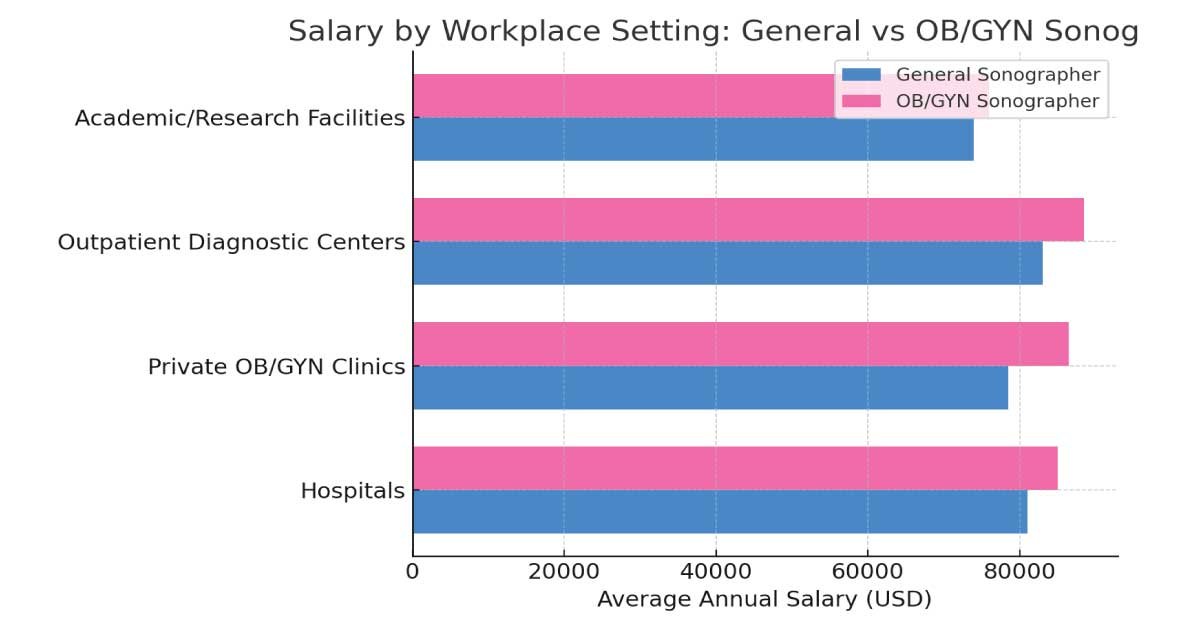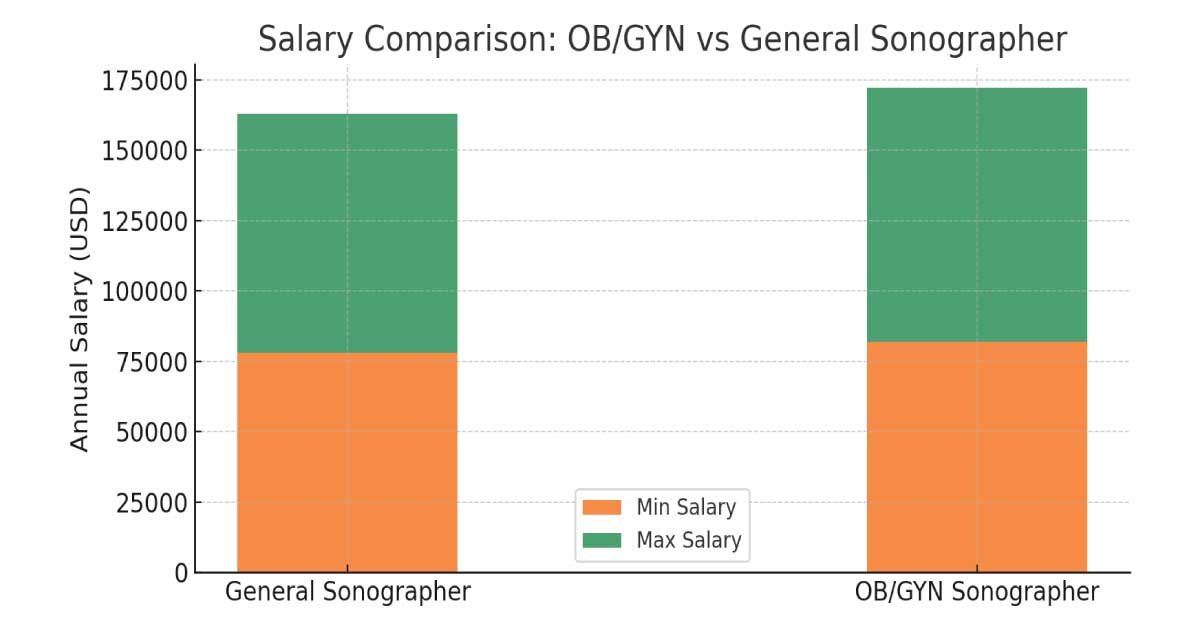When most people think about careers in healthcare, they often picture doctors and nurses. Yet, many vital professionals work behind the scenes, using advanced technology to help with diagnosis and treatment. Among them are sonographers, who use ultrasound imaging to create detailed pictures of the body. Within this field, some specialize in general sonography, while others focus on OB/GYN sonography, which deals with women’s reproductive health and pregnancy care.
One of the most common questions for anyone considering a career in this field is: “Does an OB/GYN sonographer earn more than a general sonographer?” To answer that, let’s break down salaries, job duties, career growth, and the factors that influence earning potential.
What Does a General Sonographer Do?
A general sonographer, often called a diagnostic medical sonographer, works with ultrasound technology to capture images of various body parts. Their role covers a wide range of areas:
Abdominal imaging: Examining organs like the liver, kidneys, pancreas, and gallbladder.
Vascular imaging: Checking blood flow in arteries and veins.
Musculoskeletal scans: Looking at muscles, joints, and ligaments.
Soft tissue evaluations: Detecting lumps, cysts, or abnormalities in different areas of the body.
General sonographers are versatile, working in hospitals, outpatient clinics, and private practices. Their job is diverse, but because it’s a broad field, salaries can vary widely depending on specialization and workplace setting.
What Does an OB/GYN Sonographer Do?
An OB/GYN sonographer specializes in women’s reproductive health and prenatal care. Their role is more focused but equally important:
Pregnancy scans: Monitoring fetal growth, development, and heartbeat.
Gynecological imaging: Checking reproductive organs for conditions like cysts, fibroids, or infertility issues.
High-risk pregnancy monitoring: Assisting doctors with detailed imaging when complications are suspected.
OB/GYN sonographers often build strong relationships with patients, especially during pregnancy. Their job blends technical expertise with emotional support, as they are part of some of the most meaningful moments in a family’s life.
Salary Comparison: OB/GYN Sonographer vs General Sonographer
Now, let’s get into the numbers. Salaries for sonographers vary based on location, experience, certifications, and work setting.
Average Salaries in the U.S.
General Sonographer Salary: Around $78,000 – $85,000 per year, or $37 – $42 per hour.
OB/GYN Sonographer Salary: Around $82,000 – $90,000 per year, or $39 – $44 per hour.
While both professions pay well, OB/GYN sonographers tend to earn slightly more. This salary bump is often due to their specialized skill set and the consistent demand for prenatal and gynecological imaging.
Entry-Level vs Experienced Pay
Experience has a big influence on earnings in both fields:
Entry-Level General Sonographer: $60,000 – $65,000 annually.
Experienced General Sonographer (10+ years): $95,000 – $100,000+.
Entry-Level OB/GYN Sonographer: $62,000 – $68,000 annually.
Experienced OB/GYN Sonographer (10+ years): $100,000 – $105,000+.
This shows that both paths offer strong earning potential over time, but OB/GYN specialists may see slightly higher ceilings due to their focused expertise.
Salary by Workplace Setting
Where a sonographer works also shapes salary potential. Here’s a comparison:
| Workplace Setting | General Sonographer | OB/GYN Sonographer |
|---|---|---|
| Hospitals | $78,000 – $84,000 | $82,000 – $88,000 |
| Private OB/GYN Clinics | $75,000 – $82,000 | $83,000 – $90,000 |
| Outpatient Diagnostic Centers | $80,000 – $86,000 | $85,000 – $92,000 |
| Academic/Research Facilities | $70,000 – $78,000 | $72,000 – $80,000 |
As the table shows, OB/GYN sonographers often earn more in clinics and outpatient centers, while salaries in hospitals are closer between the two groups.

🌈 Read This Comprehensive Guide 👉 OB GYN Sonographer Salary in USA: Complete Guide
Salary by State
Pay also depends heavily on location. States with higher costs of living generally offer higher salaries.
California
-
-
General Sonographer: $95,000+
-
OB/GYN Sonographer: $100,000+
-
Texas
-
-
General Sonographer: $82,000
-
OB/GYN Sonographer: $86,000
-
Florida
-
-
General Sonographer: $76,000
-
OB/GYN Sonographer: $80,000
-
New York
-
-
General Sonographer: $88,000
-
OB/GYN Sonographer: $92,000
-
This pattern shows that OB/GYN sonographers typically have an edge of $3,000 – $5,000 annually over general sonographers across most states.
Factors That Influence Sonographer Salaries
Several elements impact whether a sonographer earns more or less than average:
Certifications – Specialized credentials (like RDMS in OB/GYN) can boost earning power.
Experience Level – Senior sonographers naturally command higher salaries.
Workplace – Hospitals often pay steady wages, while private practices may pay more but offer fewer benefits.
Location – Urban areas generally pay more due to higher patient volume and cost of living.
Overtime/On-Call Work – Those who take night shifts or emergency call-ins often earn extra pay.
How Certifications Impact Salaries
One of the biggest factors that can widen the salary gap between a general sonographer and an OB/GYN sonographer is certification. The American Registry for Diagnostic Medical Sonography (ARDMS) offers specialized credentials that employers value highly.
General Sonographers often pursue certifications in abdominal (AB), vascular (RVT), or musculoskeletal imaging. Holding more than one specialty usually boosts pay.
OB/GYN Sonographers typically earn the RDMS credential in Obstetrics and Gynecology. Since this is a specialized certification, it can open doors to higher-paying positions in hospitals and OB/GYN practices.
In some cases, sonographers with advanced certifications earn 10–15% more than those without. That means a general sonographer with multiple specialties could potentially out-earn an OB/GYN sonographer who holds only one credential.
Job Demand and Career Outlook
Both general and OB/GYN sonographers enjoy strong job security. According to healthcare workforce trends, demand for diagnostic medical sonographers is expected to grow by 10%+ over the next decade, much faster than the average for all occupations.
General Sonographers are needed in nearly every hospital and diagnostic center.
OB/GYN Sonographers benefit from the steady demand for prenatal and reproductive health services, meaning there will always be a need for their skills.
In simple terms: both fields are safe, growing career choices.
Career Growth and Advancement
While salaries are important, career growth also plays a huge role when comparing OB/GYN and general sonography.
General Sonographers can branch into specialized imaging fields, take on leadership roles, or even transition into teaching and training new sonographers.
OB/GYN Sonographers can grow into senior ultrasound positions, work with maternal-fetal medicine specialists, or move into clinic management.
Another option for both is to step into travel sonography, where professionals take temporary assignments in high-demand areas. Travel sonographers often earn more, sometimes adding $10,000 – $20,000 annually to their income through stipends and housing allowances.
Which Career Pays More in the Long Run?
While OB/GYN sonographers generally earn a little more, the difference isn’t massive. Instead, the better choice depends on your personal interests and career goals:
-
If you enjoy variety and working across multiple body systems, general sonography might suit you.
-
If you are passionate about women’s health and pregnancy care, OB/GYN sonography could be more rewarding, both emotionally and financially.
Career Journeys
To bring this comparison to life, let’s look at two sonographers’ stories:
Maria, General Sonographer: Maria started in a hospital radiology department, scanning abdominal and vascular patients. Over the years, she added certifications in vascular imaging, which boosted her pay to nearly six figures. She loves the variety of cases she sees daily.
Jessica, OB/GYN Sonographer: Jessica works in a busy women’s clinic, performing prenatal ultrasounds. She earns slightly more than Maria, but what she values most is the joy of helping expectant mothers. She says, “Every day, I get to be part of someone’s happiest moments.”
Both stories show that the right path depends on both financial goals and personal fulfillment.
Pros and Cons of Each Path
General Sonographer
Pros:
-
Broad skill set and flexibility.
-
Diverse job opportunities.
-
Chance to specialize further in vascular or musculoskeletal imaging.
Cons:
-
Salary slightly lower than OB/GYN sonography.
-
Work may involve emergency or trauma cases, which can be stressful.
OB/GYN Sonographer
Pros:
-
Higher average pay.
-
Emotionally rewarding, especially in pregnancy care.
-
Consistent demand in clinics and hospitals.
Cons:
-
Narrower specialization compared to general sonography.
-
Emotional challenges in cases of pregnancy complications.
The Bottom Line
At the end of the day, both general and OB/GYN sonographers are well-compensated professionals in a growing field. The salary differences may not be life-changing, but they highlight how specialization, certifications, and workplace choices all play a role in shaping earnings. Whether you choose the versatility of general imaging or the rewarding focus of OB/GYN care, both paths offer a financially stable and fulfilling career in healthcare.
Final Thoughts
So, when it comes to OB/GYN sonographer salary vs general sonographer salary, the difference isn’t huge—but it is noticeable. OB/GYN sonographers often earn a few thousand dollars more per year, largely due to their specialization and the consistent need for reproductive health imaging.
For anyone considering this career, the decision should balance personal passion and salary goals. Both fields offer excellent pay, job security, and opportunities for growth in healthcare. Whether you choose the variety of general sonography or the focused, meaningful work of OB/GYN imaging, you’ll be entering a profession that makes a real difference in people’s lives.
💙 👉 Discover detailed Sonographer Salary reports by location, experience, and specialty. This page helps ultrasound professionals in the USA understand income levels with accurate hourly, monthly, and annual wage comparisons across different career stages.
FAQs
Do OB/GYN sonographers make more than general sonographers?
Yes, OB/GYN sonographers usually earn slightly more than general sonographers. Their specialized skills in women’s health and pregnancy care give them an edge. On average, the difference is about $3,000–$5,000 annually, depending on location and work setting. However, a general sonographer with multiple certifications can sometimes out-earn an OB/GYN sonographer by broadening their skill set.
Which career has better job security: general or OB/GYN sonography?
Both careers offer excellent job security. General sonographers are always in demand because they cover multiple body systems, while OB/GYN sonographers benefit from steady demand in prenatal and reproductive health care. Since healthcare needs continue to grow across the U.S., both paths provide strong career stability and a positive long-term outlook. Neither field is considered more at risk than the other.
How much do entry-level sonographers earn?
Entry-level general sonographers typically start around $60,000–$65,000 annually, while OB/GYN sonographers may start slightly higher, around $62,000–$68,000. These numbers can vary based on state, cost of living, and whether the position is in a hospital, outpatient clinic, or private practice. Over time, both paths offer excellent growth potential with experienced professionals often earning over $100,000 per year.
Does certification affect salary differences?
Absolutely. Certification is one of the most important factors influencing salary. OB/GYN sonographers usually earn the RDMS credential in Obstetrics and Gynecology, which can boost pay. General sonographers often stack multiple certifications—like abdominal, vascular, or musculoskeletal imaging—leading to higher earnings. Employers tend to offer better salaries to those with specialized credentials, as it shows advanced skills and commitment to professional growth.
Where do sonographers earn the highest salaries?
Sonographers in states like California, New York, and Massachusetts generally earn the highest salaries, with many making over $95,000 annually. OB/GYN sonographers often earn a bit more in these regions compared to general sonographers. Urban hospitals and outpatient centers typically offer higher pay than rural clinics, largely due to patient demand and cost of living adjustments. Location is a major salary driver in this career.
Is OB/GYN sonography more emotionally rewarding than general sonography?
Many OB/GYN sonographers say their work feels deeply rewarding because they play a role in life-changing moments, such as pregnancy milestones. However, it can also be emotionally challenging during high-risk pregnancies. General sonographers often appreciate the variety of cases and the chance to apply their skills in many areas of the body. Both careers bring meaningful impact but in different ways.

